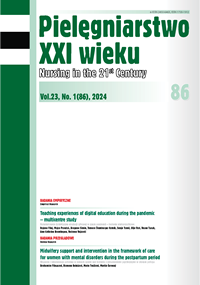Postawy pielęgniarek w stosunku do pacjentów z towarzyszącym problemem alkoholowym i ich wpływ na świadczenie opieki
DOI:
https://doi.org/10.2478/pielxxiw-2024-0008Słowa kluczowe:
choroba alkoholowa, pacjent, opieka pielęgniarska, postawy, emocjeAbstrakt
PODSTAWY PILĘGNIAREK W STOSUNKU DO PACJENTÓW Z TOWARZYSZĄCYM PROBLEMEM ALKOHOLOWYM I ICH WPŁYW NA ŚWIADCZENIE OPIEKI
Cel pracy. Analiza postaw personelu pielęgniarskiego wobec pacjentów ze współtowarzyszącym problemem alkoholowym.
Materiał i metody. Badanie przeprowadzono wśród 120 pielęgniarek jednego ze szpitali na terenie Podbeskidzia (Polska). Użyto sondażu diagnostycznego, a narzędziem badawczym był kwestionariusz ankiety własnej konstrukcji.
Wyniki. 93.3% badanych potwierdziło styczność z uzależnionymi wśród swoich pacjentów. Badani uważają, że wykształcenie i status społeczny pacjentów uzależnionych (41.8%) oraz ich płeć (54%) mają znaczenie w traktowaniu ich przez personel medyczny i wpływają na jakość świadczonych usług. Postawy i odczucia jakie towarzyszą badanym w opiece nad pacjentem ze współtowarzyszącym problemem alkoholowym mają najczęściej wydźwięk negatywny bądź obojętny.
Wnioski. W rzeczywistości klinicznej ma miejsce stygmatyzowanie i raczej nieprzychylna lub obojętna postawa w stosunku do pacjentów z towarzyszącym problemem alkoholowym. Personel uważa pracę z alkoholikiem za trudną, a samego alkoholizmu nie traktuje na równi z innymi jednostkami chorobowymi.
Bibliografia
1. WHO. (2022) International Classification of Diseases 11th Revision. The global standard for diagnostic health information. https://icd.who.int/browse11/l-m/en#/ http://id.who.int/icd/entity/1580466198 (dostęp: 28.03.2021).
2. Carvalho AF, Heilig M, Perez A, et al. Alcohol use disorders. Lancet 2019; 394: 781¬792. http://dx.doi.org/10.1016/S0140-6736(19)31775-1.
3. WHO (2018) Global status report on alcohol and health. Geneva: World Health Organization. (Licencja: CC BY-NC-SA 3.0 IGO) (dostęp: 28.03.2021).
4. World Population Review (2022) Alcoholism by country 2022. https:// worldpopulationreview.com/country-rankings/alcoholism-by-country (dostęp: 28.03.2021).
5. Hadera F, Babuśka-Roczniak M, Brodziak-Dopierała B, i wsp. Opinia pracowników izby przyjęć na temat udzielania pomocy medycznej pacjentom będącym pod wpływem alkoholu. Med Srod 2022; 25(3-4): 59-65. https://doi:10.26444/ ms/155916.
6. Burak A, Dembna I, Cierzniakowska K, et al. The patient under the influence of alcohol - discriminated victim or aggressor? Alcoholism Drug Addiction. 2016; 29(3): 131-152. http://dx.doi.org/10.1016/j.alkona.2016.09.001.
7. Molina-Mula J, González-Trujllo A, Simonet-Bennassar M. Emergency and mental health nurses’ perceptions and attitudes towards alcoholics. Int. J. Environm. Res. Public Health. 2018; 15: 1773-1782. https://doi.org/10.3390/ijerph15081733.
8. Souza LGS, de Andrade AL, Menandro MCS, et al. Perceptions of primary health care professionals towards alcoholic patients: an exploratory study in a Brazilian municipality. Univ Psychol. 2015; 14(3): 1045-1054. https://doi.org/10.11144/ Javeriana.upsy14-3.pphc.
9. Chozom S, Neuhann F, Krahl W. Exploring the attitudes towards patients diagnosed with Alcohol Use Disorder (AUD): a qualitative study of nurses at the national referral hospital, Bhutan. J. Nurs. Pract. 2021; 4(2): 117-129. https://doi.org/10.30994/jnp. v4i2.116.
10. Bové HM, Lisby M, Norlyk A. Scheduled care - as a way of caring: a phenomenological study of being cared for when suffering from alcohol use disorders. J. Clin. Nurs. 2019; 28: 1174-1182. http://dx.doi.org/10.1111/jocn.14715.
11. Seabra P., Nunes I., Silva V.,Valentim O., et al. Cultural adaptation and validation of the Attitudes Towards Alcohol Scale for health professionals in Portugal. Int J Ment Health Addiction 2023. https://doi.org/10.1007/s11469-023-01193-w
12. Rehm J. The risks associated with alcohol use and alcoholism. Alcohol Res Health 2011; 34(2): 135-143.
13. Axley PD, Richardson CT, Singal AK. Epidemiology of alcohol consumption and societal burden of alcoholism and alcoholic liver disease. Clin. Liver. Dis. 2019; 23(1): 39-50. https://doi.org/10.1016/j.cld.2018.09.011.
14. Shield KD, Parry Ch, Rehm J. Chronic diseases and conditions related to alcohol use. Alcohol Res. Curr. Rev. 2013; 35(2): 155-173.
15. Kratovil A, Schuler MS, Vottero BA, et al. Nurses’ self-assessed knowledge, attitudes, and educational needs regarding patients with substance use disorder. Am. J. Nurs. 2023; 123(4): 26-33. https://doi.org/10.1097/01.NAJ.0000925496.18847.c6.
16. van Boekel LC, Brouwers EPM, van Weeghel J, et al. Stigma among health professionals towards patients with substance use disorders and its consequences for healthcare delivery: systemic review. Drug Alcohol Depen. 2013; 131: 23-35. http://dx.doi.org/10.1016/j.drugalcdep.2013.02.018.
17. de Vargas D. Nurses’ personal knowledge and their attitudes toward alcoholism issues: a study of a sample of specialized services in Brazil. J. Nurs. Educ. Pract. 2014; 4(2): 123-131. http://dx.doi.org/10.5430/jnep.v4n2p123.
Pobrania
Opublikowane
Numer
Dział
Licencja
Prawa autorskie (c) 2024 Autorzy

Utwór dostępny jest na licencji Creative Commons Uznanie autorstwa 4.0 Międzynarodowe.




